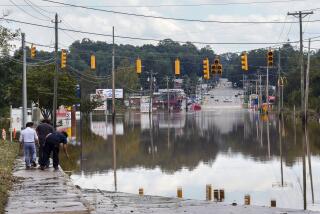Health Officials Upbeat
- Share via
In the face of ongoing criticism about the speed and effectiveness of the hurricane relief effort, the nation’s top health officials defended federal efforts to provide health services in Katrina’s aftermath.
“We are one week out, and so far, so good,” said Health and Human Services Secretary Mike Leavitt during a teleconference Tuesday.
He blamed security risks and chaotic conditions for the problems in delivering care to evacuees stranded last week in the New Orleans convention center and Superdome.
Leavitt and Dr. Julie L. Gerberding, director of the Centers for Disease Control and Prevention, said local and federal disaster preparations had been based on the smaller-scale disruption of earlier hurricanes.
Leavitt, who toured the disaster area over the Labor Day weekend, said federal health officers are present in all major shelters and are working with local medical teams to provide services despite primitive conditions.
“The response was massive, led in large measure by local communities,” Leavitt said. “I would judge it to have been strong and high-quality, but predictably imperfect.”
He said records experts in Houston had set up a 50-computer control center for creating medical records for evacuees.
Leavitt said the flow of injuries and illnesses had begun to abate at acute-care centers set up at shelters. The Federal Emergency Management Agency is setting up more than 1,000 emergency hospital beds to supplement the approximately 1,000 still functioning in the New Orleans area.
A makeshift command center for health services has been set up at Kindred Hospital in New Orleans.
On Monday, the CDC recorded several intestinal infections with vibrio vulnificus, a bacterium related to but normally less dangerous than the microbe that causes cholera.
On Tuesday, the agency reported four deaths from wounds infected with the microbe, according to the Associated Press. But no major infectious outbreak has yet been reported in hurricane areas.
Gerberding downplayed the likelihood of an outbreak of cholera, an often-deadly diarrheal illness, because it is rare in the affected region. She said victims who have been wading in sewage-contaminated water could easily contract other diarrheal diseases, such as those caused by E. coli or noroviruses, which have sometimes caused outbreaks on cruise ships but are rarely life-threatening.
Gerberding said that health risks from the many floating corpses are slight.
“Dead bodies are horrifying,” she said, “but ... bodies in the water do not pose an infectious disease threat.
“We’re much more concerned about the common illnesses that any crowded condition can promote,” Gerberding said.
The CDC has provided 140 infection-control specialists to the region, who are training patients on the importance of hand cleansing and providing supplies of alcohol-based hand sanitizers.
They are also vaccinating children from poor areas, whose immunizations may not be up to date, to prevent measles and other childhood diseases. Many adult evacuees are receiving flu and tetanus shots.
In a related development Tuesday, officials at the National Institutes of Health said its specialists had opened a field hospital for evacuees in Meridian, Miss. The facility has been outfitted with 250 beds and is equipped to treat a range of patients.
“It’s up and functional,” said Dr. Raynard S. Kington, deputy director of the NIH in Bethesda, Md. John Burklow, an agency spokesman, said the hospital would initially operate with a 48-member staff -- 27 from the NIH and 21 from Duke University. He said the staff would be led by Dr. Pierre Noel, a senior blood expert from the NIH.
As of Tuesday evening, patients had not yet been admitted, Burklow said.
Times staff writer David Willman in Washington contributed to this report.
More to Read
Sign up for Essential California
The most important California stories and recommendations in your inbox every morning.
You may occasionally receive promotional content from the Los Angeles Times.













